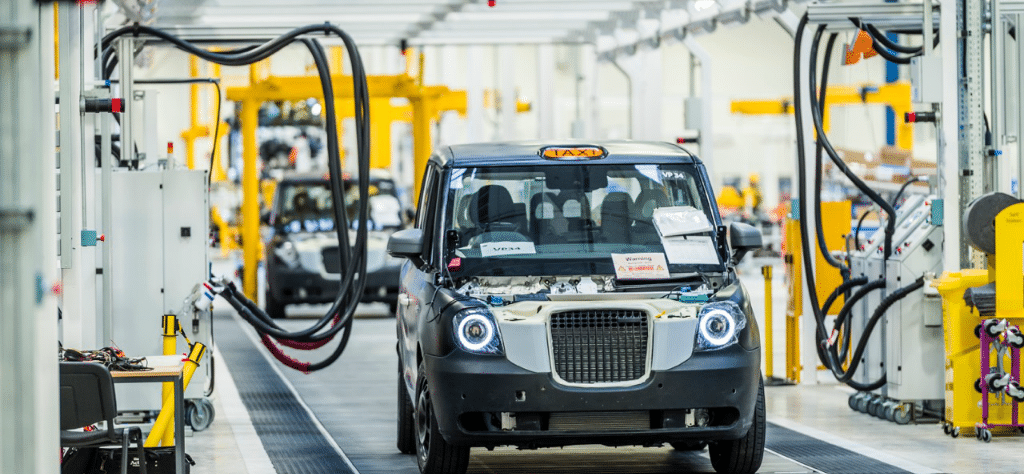ONE
Geely’s London Taxi Company (LTC) this week opened a dedicated 20,000 unit per year electric vehicle plant in the UK, bringing Geely‘s investment in the company to £325 million. The plant located in Antsy, Coventry is the first all-new vehicle manufacturing facility constructed in the UK for the last 10-years. The investment by Geely, the second investment from China in the UK sector over the last two weeks, will create more than 1,000 jobs, of which 230 will be engineering jobs. A couple of weeks back Shanghai-listed Far East Smarter Energy Group announced an investment in UK-based Detroit Electric for the manufacturing of the SP:01 EV, creating 400 jobs.
The taxi EV to be manufactured at the plant underwent stringent testing, including being exposed to extreme weather conditions while covering over 500,000 km / 310,000 miles. The London Taxi Company‘s research and development team of around 200 people, based at Antsy, have been developing the company’s lightweight EV platform. The platform together with Volvo’s electric car powertrain provides the basis for an ultra low emission commercial vehicle. The working relationship with Volvo, another Geely-owned company, provides further technical expertise to the LTC team. The commercial launch of the taxi is in the 4th quarter 2017 for the UK market and 2018 for the international market.
London Taxi Company announced further that it would manufacturer a second vehicle at its new electric vehicle manufacturing facility. The company will produce a new range-extended Light Commercial Vehicle (LCV) EV for the international market, competing with the highly successful Renault Kangoo and Nissan e-NV200. Geely invested £30 million in research and development to bring the new LCV to market.
TWO
NextEV gets support for its autonomous car the NIO EVE. Baidu Inc, the Chinese search engine this week led an investment round estimated at $600 million into NextEV. Baidu, looking for new growth areas, created a $3 billion investment fund, Baidu Capital, found the fast-growing electric vehicle market attractive at a time when the vehicle and the internet are moving closer to each other. NextEV raised $500 million in 2016 from investors such as Tencent, who is also invested in Future Mobility, Hillhouse Capital, who also invested in UBER, Sequoia Capital and Joy Capital.
THREE
A trademark complaint in China filed by Chery Auto will hamper Mercedes-Benz new electric vehicle brand EQ‘s international aspirations. The Chery eQ, one of the most popular EV micro car’s in China over the last two years share too much similarity for the German automaker to be allowed to use the name in the worlds’ largest electric vehicle market. The Chery eQ sold around 25,000 units since it’s launch in 2015, making it one of the top 10 electric vehicles in the country. Mercedes-Benz launched the EQ brand at the Paris Auto Show in late 2016 to house all its electric vehicle products and services. One can only wonder how a large corporate could have let that one slide! The EQ brand stands for “Electric Intelligence” and is the spearhead for Daimler’s efforts to have electric vehicles represent between 15% and 25% of its global sales.
FOUR
Mahindra and Mahindra Ltd is eyeing both luxury electric vehicles comparable to Tesla under the Pininfarina brand and mass market vehicles. Mahindra’s MD, Mr. Pawan Goenka made the comments in an interview with the Indian publication Live Mint. According to Mr. Goenka, he does not foresee the Indian Government to go the subsidy route. It is, therefore, necessary for EV prices to come down between Rs40,000-50,000 (around $750) for it to make financial sense. He admitted that the company is currently losing money on EV’s but that Mahindra is in it for the long haul, and will remain committed to the sector. Mahindra is targeting the Asean (Association of Southeast Asian Nations) markets for its EV business.
FIVE
BMW is shedding some lite on its short-term electric vehicle strategy, according to Reuters, citing CEO Harald Krüger. The German automaker hinted that the Mini could be the BMW mass-market electric car, competing with the Tesla Model 3 and Chevrolet Bolt, as the company targets over 100,000 EV sales for 2017, up from 62,000 in 2016. Read our full blog on the press release here.

